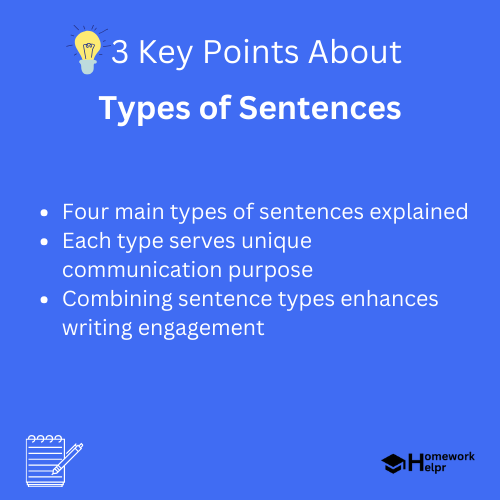📝 Summary
Sentences are the building blocks of language, expressing thoughts and conveying information. They fall into four main types: declarative, interrogative, imperative, and exclamatory. Each type has its unique role; declarative sentences make statements, interrogative sentences ask questions, imperative sentences issue commands, and exclamatory sentences express strong emotions. Understanding these types is crucial for effective writing and communication, allowing for more engaging and impactful expression of ideas.
Types of Sentences
Sentences are the building blocks of written and spoken language. They express thoughts, convey information, and facilitate communication. Understanding the different types of sentences is crucial for effective writing and can greatly enhance your language skills. In this article, we will explore the four main types of sentences: declarative, interrogative, imperative, and exclamatory. Each type serves a unique purpose in communication, making it important for students to grasp these concepts.
1. Declarative Sentences
Declarative sentences are used to make a statement or express an opinion. They provide information and end with a period. These sentences can be simple or complex and are the most common type of sentence you will encounter.
- Example of a simple declarative sentence: “The sky is blue.”
- Example of a complex declarative sentence: “Although it was raining, we decided to go for a walk.”
Declarative sentences can be affirmative or negative. An affirmative declarative sentence states a fact, while a negative one denies it. For example, “She is reading a book” (affirmative) and “She is not reading a book” (negative).

Definition
Affirmative: A statement that is positive or asserts something to be true.
Negative: A statement that denies something or indicates the absence of a quality or action.
Examples
1. “Cats are independent animals.” (affirmative)
2. “Dogs do not prefer to stay alone.” (negative)
2. Interrogative Sentences
Interrogative sentences are questions that seek information. They typically begin with question words such as who, what, where, when, why, or how and end with a question mark.
- Example of a simple interrogative sentence: “What is your name?”
- Example of a complex interrogative sentence: “Why did you decide to study biology?”
The purpose of an interrogative sentence is to elicit information or engage in a conversation. They can be open-ended, which allow for more elaborate responses, or closed, which can be answered with a simple ‘yes’ or ‘no’.
Definition
Open-ended questions: Questions that require more than a one-word answer and encourage detailed responses.
Closed questions: Questions that can be answered with a simple ‘yes’ or ‘no’.
Examples
1. “How do you feel about the new student?” (open-ended)
2. “Did you finish your homework?” (closed)
3. Imperative Sentences
Imperative sentences express a command or a request. They often omit the subject, making the command direct and clear. These sentences can end with a period or an exclamation mark depending on the strength of the command.
- Example of a simple imperative sentence: “Close the door.”
- Example of a more emphatic imperative sentence: “Please, pass the salt!”
Imperative sentences can also be positive or negative. A positive imperative gives a command or request, while a negative one advises against something. For instance, “Finish your project” (positive) versus “Don’t skip the introduction” (negative).
Definition
Command: An authoritative order to someone to do something.
Request: A polite or formal way of asking someone to do something.
Examples
1. “Turn off the lights before leaving.” (positive)
2. “Don’t forget to wear your helmet.” (negative)
4. Exclamatory Sentences
Exclamatory sentences express strong emotions or excitement. They are often punctuated with an exclamation mark at the end. These sentences can convey feelings like joy, surprise, anger, or astonishment.
- Example of an exclamatory sentence: “What a beautiful sunset!”
- Another example: “I can‚Äôt believe we won the game!”
Exclamatory sentences help in emphasizing a point or expressing a reaction to a particular situation. They are less formal than other types of sentences and often reflect the speaker’s feelings.
Definition
Astonishment: A feeling of great surprise or wonder.
Emotion: A natural instinctive state of mind deriving from one’s circumstances, mood, or relationships with others.
Examples
1. “That roller coaster was intense!”
2. “Wow, you did an amazing job on your presentation!”
❓Did You Know?
Did you know? Many languages have different rules for sentence structures. For example, in German, the verb typically comes second in a main clause!
Combining the Types of Sentences
In writing, it’s important to combine different types of sentences to create a more dynamic and engaging text. Varying your sentence structure adds rhythm and interest, helping to hold the reader’s attention. Here are some tips on how to effectively combine the types of sentences:
- Start with a strong declarative statement to provide information.
- Follow with an interrogative to engage the reader or encourage a conversation.
- Use imperative sentences to give instructions or commands.
- End with an exclamatory sentence to express enthusiasm or a strong emotion.
For example, you might write: “The park is beautiful (declarative). What do you think about it? (interrogative) Don‚Äôt forget to take your camera! (imperative) I can‚Äôt wait to share these pictures! (exclamatory)”
Conclusion
Understanding the four types of sentences—declarative, interrogative, imperative, and exclamatory—is essential for effective communication. By mastering these sentence types, students can enhance their writing and become more proficient in expressing their thoughts and emotions. Remember, variety is key; mixing different sentence types not only makes your writing more engaging but also allows you to convey your message more clearly. Keep practicing, and you’ll see improvement in your writing skills!
Related Questions on Types of Sentences
What are the four main types of sentences?
Answer: The four types are declarative, interrogative, imperative, and exclamatory.
What is a declarative sentence?
Answer: A declarative sentence makes a statement or expresses an opinion.
How do interrogative sentences function?
Answer: Interrogative sentences ask questions seeking information.
Why is understanding sentence types important?
Answer: It enhances writing effectiveness and communication skills.
